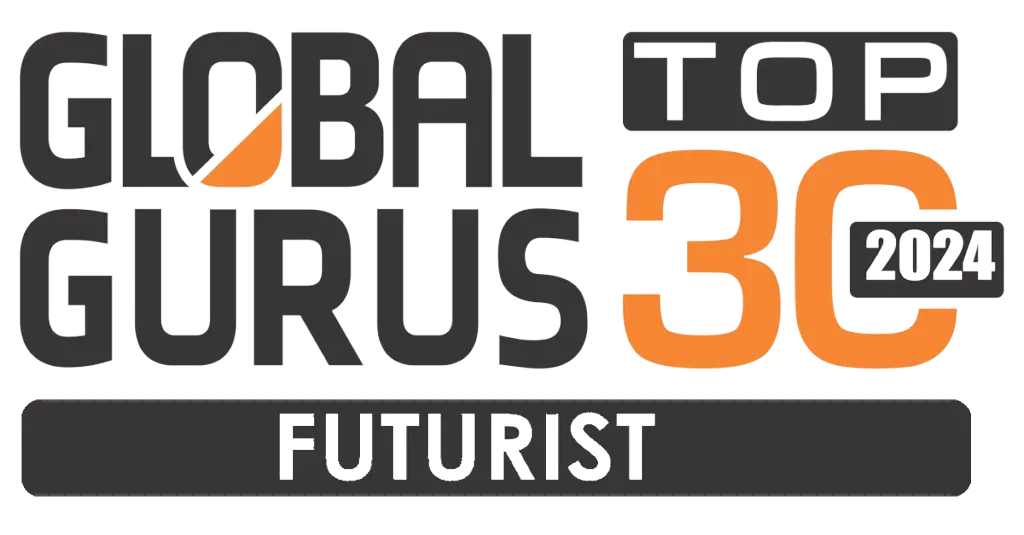Futures Thinking: The Power of Long-Term Vision

In today's fast-moving world, where technology evolves at lightning speed, futures thinking has become a must-have skill. It's not about predicting the future with a crystal ball but about preparing for it. Futures thinking equips people, organizations, and even entire societies to navigate uncertainty and come out stronger on the other side.
At its core, it balances visionary strategy with practical execution, offering a roadmap to ensure that emerging technologies like AI, digital twins, and quantum computing align with societal values while unlocking new opportunities.
For over a decade, my work as a futurist has been rooted in fostering futures thinking—balancing technological innovation with ethical foresight and a long-term perspective. Recognitions such as being named one of Salesforce’s 16 (human) AI influencers to know and a Global Gurus Top 30 Futurist Speaker (you can vote here - takes only 10 seconds!) validate this approach.

Futures thinking demands a nuanced view of emerging technologies, acknowledging their transformative power while preparing for societal impacts. These accolades underscore the importance of such a mindset in navigating the complexities of our rapidly evolving world.
Balancing Innovation and Responsibility
Technological disruption often presents a double-edged sword. On one side, innovations like generative AI revolutionize industries by automating mundane tasks, democratizing information, and enhancing operational efficiency. On the other, they raise ethical dilemmas, such as the risk of amplifying biases, breaching privacy, or accelerating job displacement. Futures thinking becomes essential here, guiding leaders to address these challenges with strategic foresight.
Consider digital twins, a technology reshaping industries like manufacturing and healthcare. These virtual replicas of physical assets, processes, systems or even systems of systems (and, of course, humans, like my digital twin) can streamline operations, predict failures, and boost efficiency. Yet, without ethical oversight, they could prioritize profits at the expense of privacy, sustainability, or fairness. This highlights the pressing need for governance frameworks that ensure technology benefits everyone, not just a select few.
Similarly, the growing centralization of AI power concentrates influence in ways that threaten innovation and exacerbate inequality. Futures thinking demands a broader lens that promotes inclusivity, accountability, and ethical design in technological deployment. These principles help organizations harness AI's potential responsibly while mitigating its risks.
Organizations that embrace futures thinking often turn to strategies like scenario planning to prepare for the challenges of AI integration. By pinpointing potential skill gaps or operational risks, they can take proactive steps such as launching targeted upskilling programs (and offering Futurwise to all their employees). These efforts tackle immediate challenges and build a culture of adaptability and lifelong learning, ensuring resilience in the face of ongoing technological change.
This mindset enables organizations to navigate the complexities of technological disruption with responsibility and foresight. By grounding innovation in ethical principles, they turn potential challenges into pathways for sustainable growth and long-term resilience. It’s about seeing disruption not as a threat, but as an opportunity to build a stronger, more adaptable future.
Resilience Through Strategic Foresight

Balancing innovation with responsibility lays the groundwork for creating adaptable, ethical and future-ready organizations. This approach isn't about merely surviving disruption but using it as a springboard to thrive. With the right mindset, businesses can turn uncertainty into an advantage, building resilience that fuels growth and innovation.
Resilience isn't merely about weathering storms; it's about turning unpredictability into opportunity. Futures thinking empowers organizations with tools like scenario planning, predictive analytics, and speculative design. These tools are essential strategies for anticipating and proactively addressing disruptions.
Predictive analytics, for instance, can revolutionize supply chains by anticipating bottlenecks and ensuring timely solutions. Yet, the real magic happens when data-driven insights work hand in hand with human intuition. This blend of precision and strategic judgment creates a dynamic approach, where technology amplifies human decision-making to deliver smarter, more resilient outcomes.
Resilient organizations also establish ethical guardrails to ensure technological advancements benefit all stakeholders. Systems built with fairness and accountability at their core foster trust and long-term success, transforming challenges into opportunities for equitable growth.
Why Futures Thinking Matters Today

Resilience and strategic foresight highlight how futures thinking transforms uncertainty into opportunity, preparing organizations for disruption while driving innovation responsibly. This foundation leads naturally to why futures thinking is particularly critical in today's landscape of rapid technological advancement.
The accelerating pace of AI innovation demands that organizations develop technical expertise and foster a culture of adaptability and curiosity. As industries from healthcare to agriculture grapple with disruptive technologies, futures thinking offers a framework for the Intelligence Age to turn challenges into transformative opportunities.
But futures thinking isn’t confined to the boardroom. It encourages teams at every level and industry to take calculated risks, challenge assumptions, and push creative boundaries. By fostering this mindset, organizations empower individuals to see opportunities in uncertainty and turn potential threats into innovative solutions.
A Call to Action for Ethical Innovation

As the world faces unparalleled disruption, futures thinking becomes essential—a guiding framework to anticipate and shape change responsibly. My recent recognitions by Salesforce as a leading global AI influencer and by Global Gurus as a top futurist speaker underscore the importance of this approach. These accolades highlight my commitment to exploring the balance between innovation and ethical responsibility and the necessity for long-term strategies that empower organizations and societies to thrive amid rapid technological transformation.
Futures thinking is more than just a one-person job. It calls for a collective effort for leaders, policymakers, technologists, and communities to join forces to ensure innovation doesn’t just happen but happens ethically and with purpose. This collaborative approach is at the heart of the Architect of Tomorrow: a vision where foresight, inclusivity, and resilience guide us toward a better future.
The real challenge is clear: Are we prepared to embrace this mindset? How can we make sure technological progress reflects the values and goals of a global society? These are questions we must explore together. Let’s keep the dialogue going and work to shape a future we’re proud to be part of.





